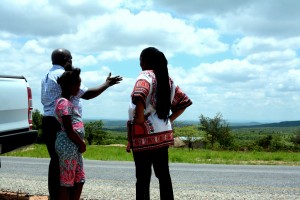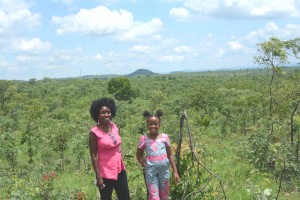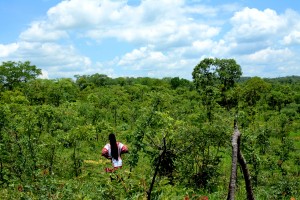by Mwizenge S. Tembo, Ph. D.
Professor of Sociology
Introduction
I was in awe triumphantly standing on a hill overlooking one of the many breathtaking beautiful valleys in Zambia particularly during the rainy season of December. This was just beyond the Chongwe Bridge East of Lusaka along the Great East Road. I had turned east on to the narrow muddy gravel road at Kazemba junction just inside Rufunsa jurisdiction. I had driven in the rental 4 wheel Ford Ranger pickup truck for 16 Kms. or 10 miles deep into the Savannah wilderness. There was a creek whose small concrete bridge might have been washed away last year. The 4 wheel drive sailed through the bottom of the shallow bridgeless creek as easily and as smoothly as changing a baby’s diaper or nappy.
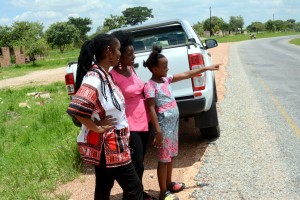
Temwani pointing to the beautiful valley just after Chongwe River bridge. Marita Banda in the middle and Mulenga Kapwepwe.
I was not alone. I was standing before the beautiful scene with two other intellectuals; Marita Banda, Mulenga Kapwepwe, and an eight year old girl Temwani Banda who was Marita Banda’s niece. What were we doing here in the wilderness away from the hustle and bustle of the Capital City of Lusaka with its nonstop action everywhere you go? This was the beginning of the culmination of the longtime dream I have had over the last 10 or even 30 years to establish a serene location in the Savannah wilderness where Zambians can contemplate knowledge.
What would be the reason of such a remote difficult to reach location? Why not open such a place in the middle of Lusaka so that seminars and workshops can be held there which everyone can attend? What will be the name of the place? What will be special about it? Am I, Mulenga Kapwepwe and Marita Banda the best and most educated intellectuals in Zambia? Why bring an 8 year old child to such a serious event? So she can jump around, rudely whine that she is bored with being in the bushes, and cause us to leave early?
The Kukaya-Kufwasa Center
The reason why the four of us were there will be explained in a rather an unusual fashion. We live in a world today in which every moment we are bombarded and overwhelmed with excessive chatter and information of little value or right out being irrelevant. I will explain the purpose of the center while describing something that happened spontaneously as the four of us were standing there in the Savannah
wilderness for hours undistracted. You will read information jam packed into this one short article because that is what happened. But there are even more surprises. If you are impatient and don’t want to read long articles that don’t say what is important in half a page in 5 short bulleted points, its time to skip this article entirely or come back to it later when you have more kufwasa time. May be you don’t know what the “kufwasa” Zambian philosophical term means. May be this is one reason this article may be very important. http://people.bridgewater.edu/~mtembo/menu/articles/kufwasa.shtml
I had first sent an article earlier in December to both Mulenga Kapwepwe and Marita Banda to read. Then I asked them if they could come on the historic trip with me. The title of that article was: “Kukaya-Kufwasa Center for Contemplation.” The idea was to bring a young girl and boy on the trip to accompany us. The reason will be explained later. The young girl Temwani Banda was quickly found but we could not find a young boy. We ran out of time.
Contemplating Knowledge Kukaya-Kufwasa Center
As we stood overlooking the beautiful valley surrounded by the serene wilderness it is as if the spirits of our ancestors going back hundreds of years had suddenly reentered our minds. There was no spirit possession here. We just begun to talk. It was nothing formal. I expressed my wish and internal drive to both share with other Zambians and go beyond the knowledge that both indigenous and foreign that I had acquired over the last 50 years. I told them about philosopher Michael Polanyi “Tacit Dimension of Knowledge”. I told them of my encounter with Temba Sangweni; a Zambian 12th grade intellectual who inspired me who was searching for knowledge in 1989 or 28 years ago.
Marita Banda brought up her knowledge of the Maharishi Effect; that the energy expressed in knowledge in humans happens in subconscious process of communication and contemplation. I told them that a week earlier, my 91 year old father who is a retired teacher told me again about “mdulo”; the traditional indigenous belief that if a young woman has improper sex and goes on to cook and serve food especially older men and women, the people become victims of mdulo which is a cough that had no scientific modern physiological explanation. The treatment is herbs. Of course the West and other Eurocentric Zambians have dismissed this and other indigenous knowledge as superstition. They will often say everyone knows those African natives live in dirty dusty unhygienic mud huts, unsanitary environments, and worst of all believe in witchcraft.
Marita also shared her deep interest in epigenetics and how they might relate to both our indigenous knowledge and improving our lives today. It was then that she said something very profound: we can really use the best from both worlds; the indigenous and Western. I agreed and added that better still we could push the frontiers of knowledge into a better, deeper and newer different direction as our ancestors might have done thousands of years ago before Europeans enslaved us via the Atlantic Slave Trade and before European colonialism over the entire African continent.
Mulenga Kapwepwe who had been listening intently had walked away briefly a few meters away. She and Temwani were deeply engrossed in the flora and fauna, and the flying and walking insects. Mulenga was using her cell phone to carefully photograph these beautiful fascinating creatures and tropical plants.
Mulenga Kapwepwe chimed in with something very profound. She said the sad part is that we as humans are changing ourselves losing so much of what we have had for over a hundred thousand years. Western technology was erasing so much of what we had learned from our physical environment as humans. She cited the example that the Western society is totally dominated by the tick tock time. As a result Western bodies have only 2 rhythms while the natural bodies here in Zambia and Africa may have up to 7 rhythms. She added that rhythm and grace are what gives us humans speed and the richness of syncopation in our lives.
I added that we Zambians do not have polyrhythmic dances anymore as the Western dominated linear rythmless choreography dance through video clips dominate our entertainment. We were actually right there and then both kukaya https://hungerforculture.com/?p=1537
and experiencing kufwasa http://people.bridgewater.edu/~mtembo/menu/articles/kufwasa.shtml
and that’s what this center was going to do; provide a serene space where Zambians can engage and contemplate deep thought and intellectual discourse.
The role of the Child
The late Nigerian Writer is the one who might have said it best. He had said being a child in Zambia and Africa gives you the best position to observe and understand life around you including that of adults. I also subscribe to the traditional Tumbuka expression: “Mwana wopulikila wakurya tuwemi”, which translates with complex metaphors as: “A child who listens to adults eats good delicious things”. The purpose of bringing 8 year old Temwani Banda to the event was that she can later bear
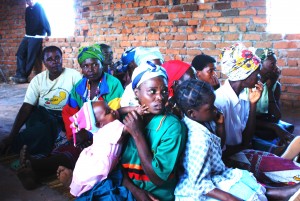
An 8 year old child sits next to the women attending a meeting of the construction of the Nkhanga Village Library in June 2009
historical testimony; that she was there when the three adults were scouting for the Kukaya-Kufwasa Center for Contemplation of Knowledge. She turned out to be the best behaved child we could have brought along. She was curious and asked questions along the way without being disruptive. At the same time she enjoyed the precious opportunity as a child should. We as Africans have traditionally allowed children to attend the most solemn of adult gatherings so long as the child behaves him or herself. Describing this custom among the TIV of Nigeria, Bohannan and Curtin (1995) say: “….children are allowed to go any place, so long as they keep quiet. They can go into the most solemn court proceedings and sit down and listen. ….children at the age of eight or nine often get interested in court cases or political meetings.” (p.73)
Conclusion
The article cannot be concluded as more happened as the four of us were deeply engrossed in quite complex intellectual discourse in the middle of the beautiful Savannah Wilderness. A second part will have more intriguing details. A woman politely intruded and broke our kufwasa.
References
- Bohannan, Paul., and Curtin, Philip, Africa and Africans, 4th edition, Prospect Heights, Illinois: Waveland Press, 1995.
- Kufwasa http://people.bridgewater.edu/~mtembo/menu/articles/kufwasa.shtml
- Kukaya https://hungerforculture.com/?p=1537
